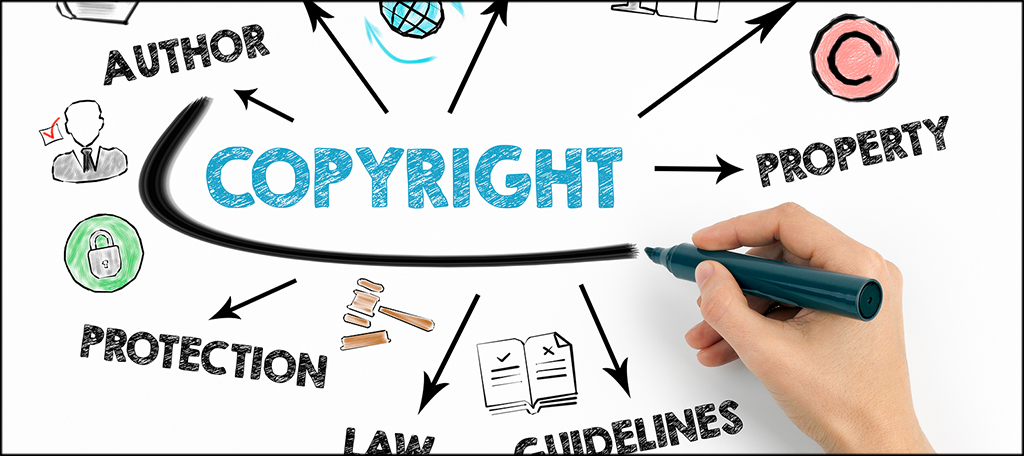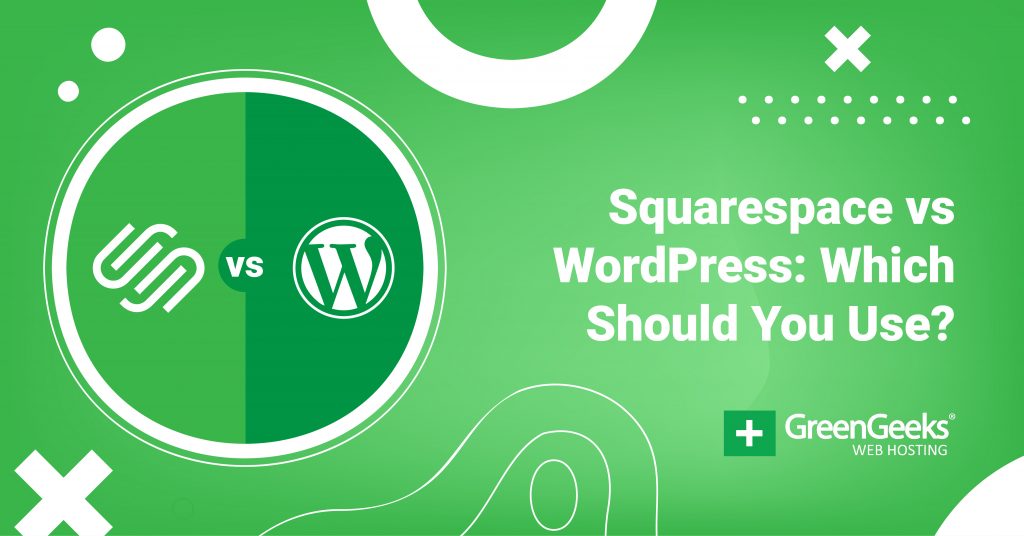When you’re starting a new website or blog, you might narrow your choices down to Squarespace or WordPress. There are a lot of other options, but Squarespace and WordPress are the dominant players in their fields. Today, we’ll talk about what those fields are, and how the platforms compare.
Which is “better” may be an unanswerable question, since the platforms target different kinds of users. But we’ll explain the differences and compare the costs so you can make an informed decision.
What Is Squarespace?
Squarespace is a website building and hosting platform. Similar services are Wix and Weebly (and, to a certain extent, hosted WordPress). Its purpose is to provide one-stop website creation and hosting.
Sites are built from templates that use point and click editing. Squarespace and similar services are designed to be used by people who want a simple path to getting their website online.
What Is WordPress?
WordPress is website software. A framework or platform that you download and install in your own (separate) hosting space. It began as blog software. Over the years, it has expanded and adapted, and it’s now commonly used to create non-blog websites.
WordPress is available in two forms, as the original downloadable software (wordpress.org), and as a service (wordpress.com). The software is commonly called “Self-Hosted WordPress,” and the service, “Hosted WordPress,” so those are the terms we’ll use.
Here are the differences between the two.
Self-Hosted WordPress
Self-Hosted WordPress is the downloaded WordPress software running in your own website hosting space. That hosting space is provided by someone other than WordPress.
For example, let’s say you use GreenGeeks web hosting. From there, you can install WordPress on your hosting package without much hassle.
When you use a self-hosted WordPress site, you are responsible for website maintenance and security. But any WordPress themes and plugins can be used, including those developed by third-parties (and there are a lot of third-party WordPress developers).
Hosted WordPress
Hosted WordPress is essentially the same WordPress package you would download, but it’s preinstalled on WordPress servers. In that way, it’s similar to Squarespace, but website creation is quite different on each platform.
Sites on the Hosted WordPress service are maintained and managed by WordPress. As the site owner, you don’t have to worry about keeping the technical aspect of your site up-to-date. But themes and plugins are extremely limited to what WordPress makes available.
We’re using self-hosted WordPress for our comparison today, with hosting services provided by GreenGeeks.
What Are We Comparing?

To compare WordPress to Squarespace, we have to use the Squarespace “Business” plan. It isn’t their lowest-priced plan, but the least expensive Squarespace plan doesn’t allow for CSS or JavaScript use.
It also doesn’t provide an eCommerce option. So we’re using the Squarespace Business plan to allow us to compare “apples-to-apples” functionality.
Our self-hosted WordPress installation is on the GreenGeeks EcoSite Lite plan. It’s the lowest-priced, most basic hosting plan at GreenGeeks, but it’s optimized for WordPress and provides everything we need.
Cost
The cost comparisons here use the Squarespace “Business” plan and the GreenGeeks EcoSite Lite plan.
Squarespace
$26 (paid monthly)
$216 / year ($18 mo)
Self-hosted WordPress
$9.95 (paid monthly)
$59.40 / year ($4.95 mo)
We compared monthly and yearly, but it’s possible to pay for up to three years of hosting at GreenGeeks. That cost would be $106.20 (for EcoSite Lite, all three years billed at once, at $2.95 per month).
Three years on Squarespace would total $648 (renewing annually at $216).
I didn’t include the domain name cost since both Squarespace and GreenGeeks include a domain for the first year. (When you pay yearly, rather than month-to-month.) Renewal fees after that are roughly equal for both platforms.
Additional Costs That Could Be Incurred Using WordPress
There are some costs that you could run into using WordPress that you wouldn’t necessarily see on Squarespace. It’s difficult to calculate exactly what those costs could be since every website has different needs. But:
- Should you decide to use a paid WordPress theme (and you probably will), the average price is $58. The cost of a theme can vary from $39 to $199, depending on the complexity.
- Similarly, paid plugins can add cost. The price range is similar to themes and varies depending on the complexity of the plugin.
- Roughly a quarter of paid WordPress themes and plugins can be purchased with a one-time fee. The rest use monthly or yearly licensing.
However, it is possible to build an amazing website while using free plugin and theme alternatives. And there is an abundance of those available for WordPress.
Additional Costs That Could Be Incurred Using Squarespace
It’s worth noting that Squarespace also has a developer community (though nowhere near the size of the WordPress developer community). So you could wind up paying more for a Squarespace site if you need customization or plugins.
The Squarespace plugins I’ve seen tend to be a bit more pricey than comparable WordPress plugins. That’s not a scientific analysis, just an observation, so take it with a grain of salt.
But it makes sense that add-ons for a paid ecosystem could be more costly than those for an open-source system.
Since there are so many variations of theme and plugin use (and cost), let’s assume that those costs would be similar for Squarespace and WordPress. So with that in mind:
Cost advantage goes to: WordPress (more so over extended periods)
Which Is Easier to Use, WordPress or Squarespace?

Squarespace uses “What You See Is What You Get” (WYSIWYG) visual tools to edit pages. That means you can drag and drop images, click to edit text, etc. That kind of “point, click, and change” page building appeals to a lot of people.
The downside is it limits what you can do to a page. You can edit many of the elements of a page using HTML code. But that kind of defeats the purpose of a WYSIWYG page-building tool.
In the early days, WordPress worked much more like a traditional HTML page building platform. And it can still be used that way if that’s what you like to work with. But the recent introduction of blocks in the WordPress Gutenberg editor has changed things.
Blocks make the WordPress page building experience more like a WYSIWYG page-builder. But WordPress is still not what I’d call “easy to use.” And it can be especially baffling for a first-time user.
Ease-of-use advantage goes to: Squarespace
Which Platform Has the Best Templates or Themes for Site Layout and Appearance?
This isn’t really a fair comparison. Squarespace offers fewer than 100 site templates or themes. There are more than 31,000 themes available for WordPress.
Granted, I’d estimate that half of those WordPress themes are useless or outdated. And many of the thousands of free themes look the same and do the same things.
But even if you throw out 90% of the available WordPress themes, there are still thousands to choose from.
The Squarespace themes are all quite professional and slick looking. They’re technically correct and adapt well to any screen size. So while there may only be 100, you can’t really go wrong choosing one.
But if you want a sidebar on your site, not a single Squarespace theme provides one. That’s a bit of a head-scratcher, but I suppose that’s done to keep the WYSIWYG page builder manageable and straightforward.
To create a sidebar in a Squarespace theme, you have to use a third-party plugin. Even then, from what I can gather, it’s not easy to implement.
Customization advantage goes to: WordPress
If You Have a Complex Site
Again, the comparison here is somewhat one-sided. A Squarespace site can only have two levels of navigation (kind of).
Squarespace sites are very “flat” by design. It isn’t possible to have a page nested any deeper than the second level. So a URL like …/paintings/watercolors/birds/ wouldn’t be possible on Squarespace.
A WordPress site can be as deep as you’d like. If you want a site structure like …/paintings/watercolors/birds/owls/horned-owls/california/ you can do it.
That’s an extreme example, but the point is, a flat site is limited in how large it can become. Categorizing and creating “silos” for different parts of your site helps humans navigate. And as a bonus, Google likes it too.
You can’t organize a flat website in that way.
Deep site advantage goes to: WordPress
Adding eCommerce

The Squarespace account that we’re using for our comparison includes their eCommerce solution. WordPress doesn’t include any eCommerce functionality by default.
But there are a few popular eCommerce plugins for WordPress, WooCommerce, for example, that are free to use.
So both platforms can do basic eCommerce. But for serious online sales, both Squarespace and WordPress require paid plugins. But once you get into the realm of paid eCommerce plugins, you’ll have more options with WordPress.
Even using the most basic eCommerce solutions, the WordPress site will be more flexible. And don’t forget, eCommerce isn’t even an option on the least-expensive Squarespace account.
Where Squarespace eCommerce wins as in ease-of-use. But for a larger store or one that caters to a worldwide customer-base, Squarespace is going to be limiting.
eCommerce advantage goes to: WordPress
Managing Content Day-to-Day
This one could be a toss-up if you only considered simple page updates. But you’re probably going to be doing more than just simple changes. Especially when you’re getting started.
Adding a new page is equally easy on both platforms. Though you may find that a simple page edit can be done more quickly on WordPress. And once you’re familiar with it, adding a page or post is also very quick and easy.
That’s mainly due to the direct access you have to your WordPress admin dashboard. You’ll do a lot more clicking in Squarespace to get to that page edit.
But what you can do with a page once it’s added is where WordPress has a considerable edge. Categories, tags, and custom content types are available in WordPress, but not in Squarespace.
So when we’re talking about managing content, Squarespace isn’t in the same league. I don’t think they’re trying to play in the same league, so a comparison may be a little unfair. But organization is important, so I find Squarespace lacking in the content management department.
Day-to-day management advantage goes to: WordPress
Search Engine Optimization (SEO)
Squarespace sites do some SEO things right: they generate a sitemap file and (generally) load quickly and are mobile-friendly. But they also do some things not so right. Like not always correctly naming alt tags and metadata, and not providing a way to configure rich snippets.
WordPress does a lot of SEO things right out of the box. But there are also WordPress plugins that take the SEO to the next level.
If you’re serious about making your website successful, you have to be serious about SEO.
SEO advantage goes to: WordPress
Maintenance and Security

Squarespace is a fully managed system, so you don’t have to do any theme updates or website security configuration. They offer a limited number of themes, and they control them all, so exploits, if they happen, are addressed quickly.
For a WordPress site, on the other hand, maintenance and security are your responsibility. There are ways to keep WordPress updated automatically, but if you don’t, you have to keep an eye on things.
There are a couple of reasons WordPress is vulnerable to security issues. First, the updating we just talked about. If you don’t do it, your WordPress installation becomes outdated, and so do your themes and plugins.
Outdated installations are a prime target for hackers.
The second reason is anyone can write a WordPress theme or plugin. No governing WordPress body checks them to make sure they don’t have built-in vulnerabilities.
You can avoid problems by choosing themes and plugins from professional developers, or those with large installation bases. And by making sure to keep everything up to date.
But don’t let me give you the idea that Squarespace sites can’t be hacked. They can.
Is it more likely that a WordPress site will be hacked? Given human nature, I’d have to say:
Maintenance and security advantage goes to: Squarespace
Support
Squarespace has good support for common issues. Like any technical support, it can become frustrating the more complicated your issue or question. But I can’t find a lot of complaints about Squarespace support.
WordPress comes with zero support. Unless you count the WordPress forums, which have answers to every question. Even if those answers can sometimes be overly technical.
So as far as support is concerned, our self-hosted WordPress site at GreenGeeks has around the clock support. Often the support staff of smaller companies provides better service than those of huge ones.
That’s hardly a rule as support can be awful anywhere. But I happen to know the GreenGeeks support staff, and I can tell you they’re smart and capable and they care about solving customer’s problems.
So assuming you use a host with competent support staff:
Support advantage goes to: (no clear winner here, since the quality of support depends on the host)
Managing Growth
We all want our websites to become popular and grow. But when websites grow in size or number of visitors, technical problems can arise. When you’re working with a web host, those problems can almost always be solved.
Maybe you’ll have to upgrade your plan, but there’s usually no disruption.
When you get into the realm of large or busy sites, I can’t find one high profile site that’s hosted on Squarespace. But TechCrunch, The New Yorker, BBC America, Bloomberg, Sony Music, and MTV News all run sites on WordPress.
And there are many more high profile names that you’d recognize.
Or say you want to branch out with your eCommerce and take payments in multiple currencies. Squarespace can’t do that. WordPress can (using the eCommerce plugin I mentioned earlier).
The same applies to language. Making your site available in multiple languages is never easy, but with WordPress it’s possible. Not so with Squarespace.
That no high profile sites run on Squarespace may be due more to its limitations than it’s performance capabilities. But that should tell you something.
Growth potential advantage goes to: WordPress
Ownership of Your Content

I don’t mean legal ownership. Though there are still rumors out there that content uploaded to Squarespace is owned by Squarespace. So does Squarespace own your content? No, it doesn’t.
But if you want to move your content away from Squarespace, they may as well own it.
There’s no “export” function at Squarespace, no way to get your hands on a copy of your website in a usable form. Which, of course, is only a problem if you never want to move the site. Or never want to expand the site beyond what Squarespace can offer.
Another issue that could be problematic for some users is Squarespace can decide that your content isn’t in line with their acceptable use policies and remove it.
Most web hosts also have policies that cover content. But their terms are usually considerably less restrictive than platforms like Squarespace. If your content is legal, most hosts won’t touch it.
But services like Squarespace have other considerations that make what’s acceptable a bit more narrow.
Data ownership and portability advantage goes to: WordPress
So Which Should You Choose, WordPress or Squarespace?
Have my biases crept into the article at all? That was a rhetorical question, I’m sure they have. And I’m sure you can guess that I would recommend WordPress over Squarespace (or any other point-and-click website company).
But I did my best to be impartial, and in doing so gave WordPress the advantage on eight points and Squarespace, only two. So based on that, I’d still give the nod to WordPress, biases or not.
But not in every case.
To be fair, if someone wants a simple one or two-page site and they don’t want to be bothered with maintenance, Squarespace will be a much better fit for them. At a cost, of course, as our price comparison showed.
But for anyone who wants more than the most basic of sites, WordPress is usually the superior solution.

